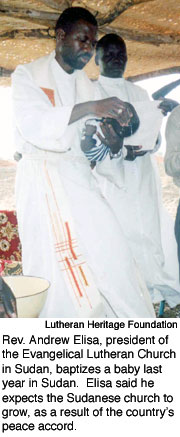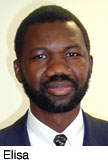By Paula Schlueter Ross
The last time Rev. Andrew Elisa, president of the Evangelical Lutheran Church in Sudan, spoke with Reporter, his church body had about 5,000 members in 23 congregations, and he was the only ordained pastor.
That was in November 2001, three years ago.
Today the Sudanes
But with the January signing of the country’s first real peace accord, ending two decades of civil war, the Lutheran church body is poised to explode even more with unprecedented growth — the number of congregations could double in a single year, according to Elisa.
“The possibility of opening more congregations is very high,” he said. “This number [of congregations] can double in 2005 — to 126. It is very possible.”
Roads that were closed during the war will open, land mines will be removed, and “we will need to go to new areas now with the Gospel — it’s going to free up now,” Elisa said during a visit to the Synod’s International Center in suburban St. Louis in February.
“There are a lot of opportunities to open so many congregations in a short given time,” he said. At the same time, there will be “very serious competition,” particularly from non-Christians.
“People are going to come. Investors are going to come. This is a challenge, this is a threat,” Elisa said.
In order for the Evangelical Lutheran Church in Sudan to take advantage of the new opportunities to spread the Gospel, Elisa said the church body will need to 
Some of those needs are being met by the Macomb, Mich.-based Lutheran Heritage Foundation (LHF), an LCMS Recognized Service Organization that works to translate, publish, and distribute confessional Lutheran books and materials worldwide.
LHF donors are providing $370,000 in funding to construct the Rich Valley Lutheran Mission Center in Baguga, in southern Sudan. The center will serve as the headquarters of the Evangelical Lutheran Church in Sudan, housing its offices — including those for translation and publishing — the seminary, and a worship facility. Plans also call for building a 1,000-student elementary school and a hospital.
“Baguga will become the Perry County of Sudan,” said LHF Executive Director Robert L. Rahn. The 11-year-old Sudanese church body, Rahn says, needs “a presence that’s very visible to the people, so they can see that this isn’t something that’s here today, gone tomorrow.”
Also assisting Sudanese Lutherans is LCMS World Relief, which has provided food, wells, and medical and agricultural assistance, and LCMS World Mission, which funds the work of two missionaries who work with Sudanese people in Sudan, Ethiopia, Kenya, and Uganda. The Sudanese Lutheran Mission Society, organized by Sudanese members of LCMS congregations, also supports training and church planting efforts among Sudanese in Africa.
“The Evangelical Lutheran Church in Sudan is the result of the efforts of many partners, including Sudanese refugees here in the United States and LCMS World Mission, all working toward the establishment of a single Lutheran church body in Sudan,” said Rev. Ken Greinke, interim regional director for Africa with LCMS World Mission. “Now that there is peace, we can tie all these efforts together.”
As Sudan drafts a constitution to guide a new national government that will include representatives from all sides of the conflict, Elisa says his church body will work to preserve the peace and encourage all sides to work together.
“The peace accord is a good thing for our church,” he said.
Elisa says the Lutheran church “has a very active role to play. We have access to people every day, every week, to preach the Word of God to them, to organize meetings for them, to provide training for them, to organize schools for them.”
Now that peace is a reality, “there are tremendous opportunities for us to spread the Word of God in Sudan,” he said.
Posted Feb. 25, 2005

